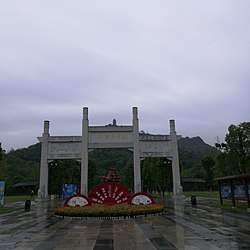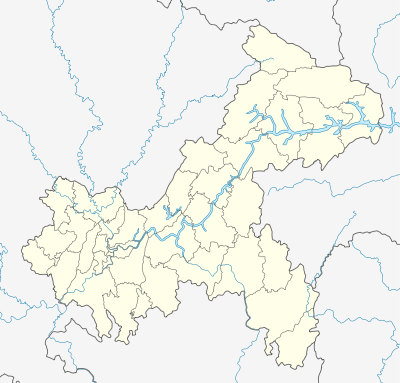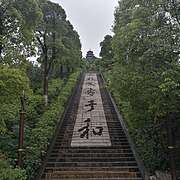Mount Puti
| Mount Puti | |
|---|---|
| 菩提山 | |
 Entrance of Mount Puti. | |
| Highest point | |
| Elevation | 598 m (1,962 ft) |
| Prominence | 598 m (1,962 ft) |
| Coordinates | 29°52′23″N 107°03′36″E / 29.873155°N 107.059911°ECoordinates: 29°52′23″N 107°03′36″E / 29.873155°N 107.059911°E |
| Geography | |
 Mount Puti Location in Chongqing. | |
| Country | China |
| Province | Chongqing |
| Geology | |
| Type of rock | Granite |
Mount Puti (Chinese: 菩提山; pinyin: Pútí Shān), also known as Mount Jing (Chinese: 晶山; pinyin: Jīng Shān) is a mountain located in Changshou District of Chongqing, China, with a height of 598 metres (1,962 ft) above sea level.
History
According to the Changshou County Annals (《长寿县志》), the mountain is named after Bodhidharma, the Indian Buddhist monk who disseminated Buddhism in ancient China.[1]
In 1507, during the Zhengde period (1506-1522) of Ming dynasty (1368-1644), Dai Jin (戴锦) , a jinshi in Changshou County, renamed it as Mount Jing.[1]
It has been categorized as a AAAA-level tourist site by the China National Tourism Administration in May 2017.[2]
Attractions
Mount Puti is noted for Puti Temple, a Buddhist temple located on the top of the mountain, it was first construction in the Northern Song dynasty (960-1127) and rebuilt many times. The present temple was reconstructed in October 2014, the complex includes the following halls: Shanmen, Mahavira Hall, Hall of Four Heavenly Kings, Hall of Guanyin, Bell tower, Drum tower, Founder's Hall, Buddhist Texts Library, Dharma Hall, Dining Room, etc.[3][4]
The Puti Lantern is a famous scenic spot in the mountain. It was first built in the Ming dynasty (1368-1644) and rebuilt in October 2014, with a height of 37.5 metres (123 ft).[3]
The Wanshou Stone Stairs is a tourist attraction on the mountain. It has 1,567 steps and 19,999 patterns of Chinese character "寿".[3]
Gallery

References
- 1 2 重庆又新添一个4A景区!长寿菩提山成功晋级. sina (in Chinese). 2017-05-08.
- ↑ 重庆长寿菩提山成功晋级国家4A景区. cnr.cn (in Chinese). 2017-05-07.
- 1 2 3 长寿菩提山文化旅游景区简介 [Brief Introduction to Mount Puti Scenic Spot]. cqnews.net (in Chinese). 2016-09-02.
- ↑ 长寿菩提山 圣灯高擎 禅韵悠悠. 163.com (in Chinese). 2016-04-06.